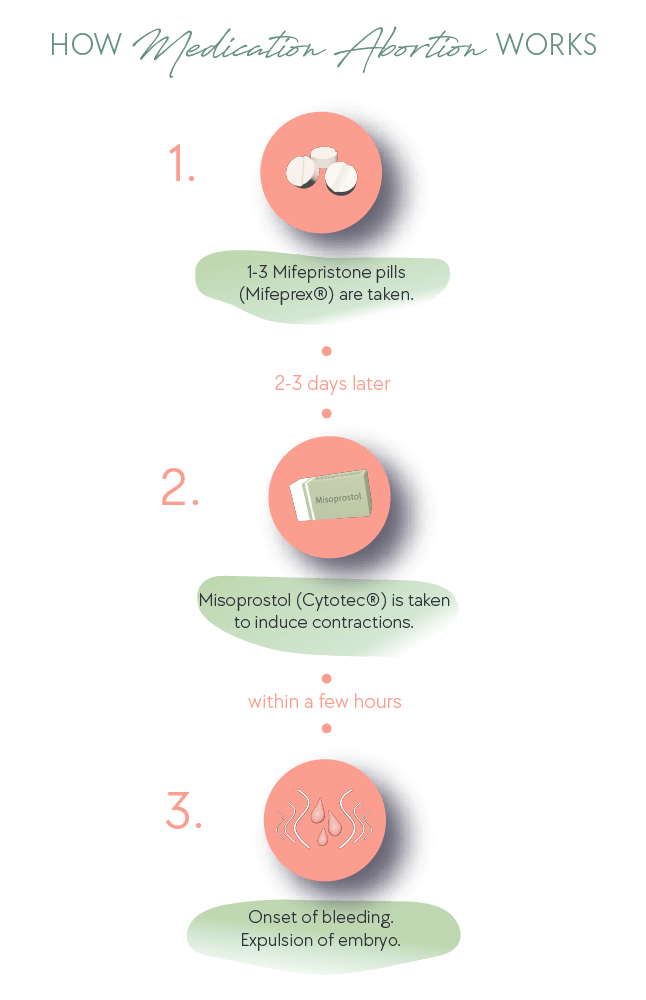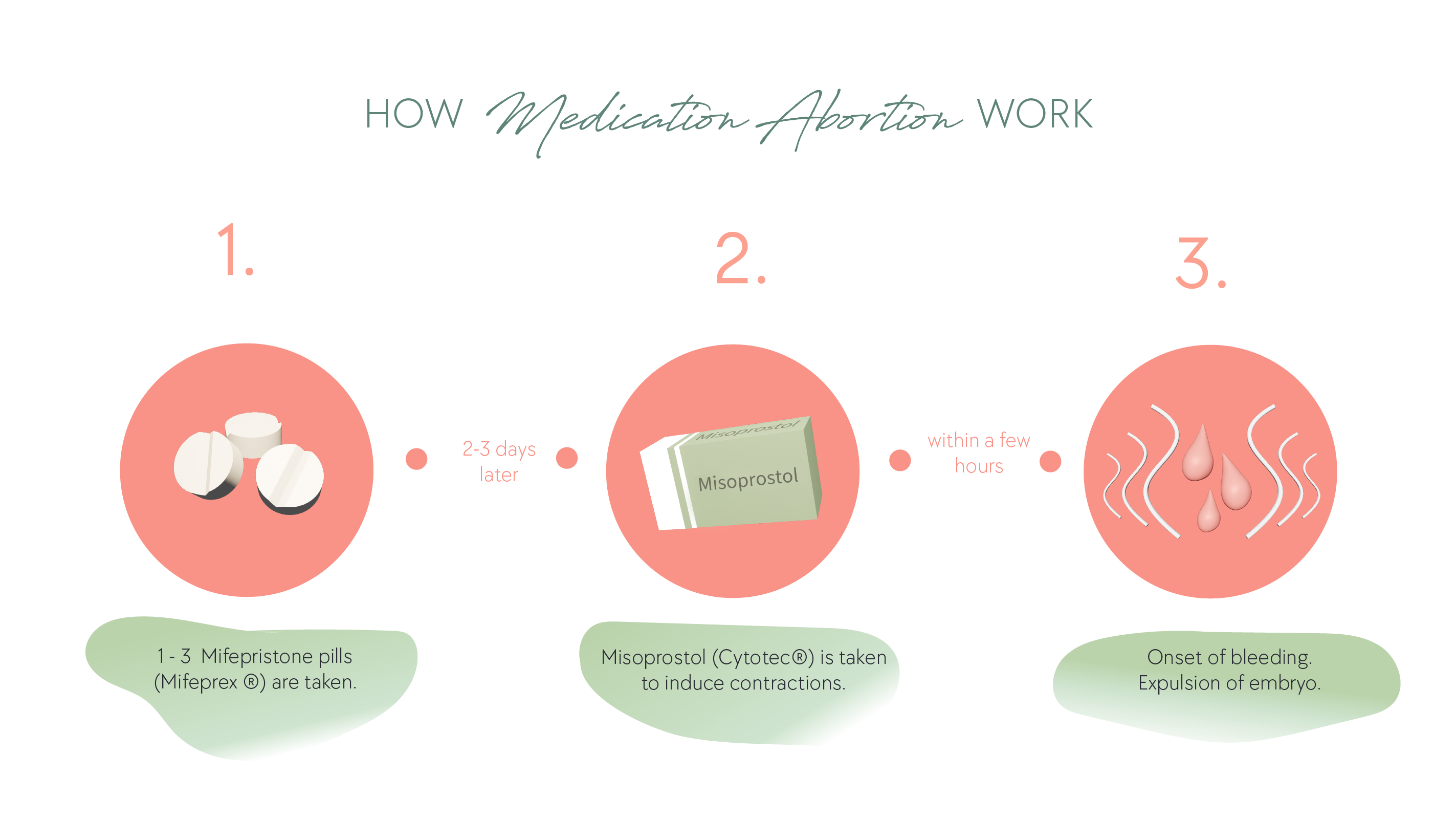Your Questions Answered about Medical Abortions
🚦Should I take the Abortion Pill? — Quiz
- Medical abortions (aka, chemical abortions, medication abortions, or Plan C abortion pill) are limited to the first nine weeks (in the UK, Australia, Ireland, and South Africa) or ten weeks (in the USA, Canada, and New Zealand) of pregnancy.
- The abortion pill regimen uses a combination of two medications: First, mifepristone is taken which causes the cervix to dilate and the uterine lining to break down. The embryo dies in the process. Another pill (misoprostol) is taken 2-3 days later, causing contractions that bring about the expulsion of the embryo.
- This page addresses the main abortion pill FAQs and links to additional questions and topics relating to medical abortions.
-
Abortion Pill Quiz
Abortion with Pills
What is Plan C?
Abortion Pill Active Ingredients
Cut-Off Dates for Medical Abortions
What is the Abortion Pill: How Does It Work and What Are the Side Effects?
What to Expect during a Medical Abortion
Risks, Advantages, and Disadvantages
How Much Does the Abortion Pill Cost?
Abortion Pill Experiences
At-Home Abortion with Mifeprex
Triggering a Miscarriage
Secret Abortion
Where Do I Go from Here?
Should I Take the Abortion Pill? [Quiz]
Is the abortion pill right for me? How does Mifeprex®️ work? Where can you get it? What experiences have other women had? If you want to know more about medical abortions and are wondering whether this is the right path for you, take this quiz and receive an immediate evaluation!
Abortion with Pills
In addition to surgical abortion methods, medication abortions are possible through pills. This is also referred to as chemical or hormonal abortion. Here, a pregnancy termination (removal of the embryo) is achieved by taking medication.
The word “pill” in this context is a colloquial term for the abortion pill.
Note: The active ingredients in the pill used for pregnancy terminations (Plan C Pill) are neither the same as the contraceptive pill (Plan A) nor the morning-after pill (Plan B).
What Is Plan C
Plan C commonly refers to the use of abortion pills to end a pregnancy.
According to this line of thinking.
- Plan A = Use birth control to not get pregnant.
- Plan B = Prevent a pregnancy after unprotected sex by using the morning-after pill.
- Plan C = Terminate a pregnancy using the abortion pill.
You may have stuck with Plan A and possibly even Plan B, but still got pregnant? This does not automatically mean that Plan C must follow. For each step, you are free to choose how you want to proceed.
Abortion Pill Active Ingredients
The abortion pill is a two-drug combination: The active ingredient of the first medication is mifepristone (mife). In addition, prostaglandin pills, such as Cytotec® with the active ingredient misoprostol (miso), are used to complete the abortion.
Mifepristone in Induction Abortions
The same two-drug combination is used for induction abortions, but the dosages differ, and the effects are more severe, requiring a hospital stay of 1-3 days.
Misoprostol Abortion
While it is possible to complete an abortion with a miso-alone protocol, it is not recommended since failure rates and risks are much higher.
For more information on Cytotec® abortions, go to Over the Counter Abortion Pill.
ℹ️ According to the New York Times (May 2, 2024), the abortion pill is presently used in almost 2/3 of US abortions. Mifeprex® is the most common abortion pill brand name. Other names for the abortion pill are Korlym®, Mifegyne®, Mifegymiso®, and RU-486.
Cut-Off Dates for Medical Abortions
- ⏳Cut-off dates for abortions vary from state to state and country to country. Find out which limits apply to your area by going to Until When Can I Get an Abortion?
There is no minimum length of pregnancy for the utilization of the abortion pill unless ultrasound requirements apply to your region. In that case, you would have to be at least six weeks along to receive the abortion pill.
What is the Abortion Pill?
How Does the Abortion Pill Work?
- The abortion pill contains the active ingredient mifepristone. Mifepristone blocks the effects of the hormone progesterone, which is essential for maintaining a pregnancy.
- Mifepristone makes the pregnant woman's body believe she is no longer pregnant.
- Within approximately 48 hours, the cervix begins to dilate, and the mucus plug loosens.
- The preliminary stage of the placenta (blastocyst) with the chorionic villi is already developing in the very first weeks of pregnancy. It is responsible for the exchange of nutrients and metabolic products between the maternal and child's circulation. Mifepristone causes the lining of the uterus with the chorionic villi to detach from the uterine wall. The embryo loses its footing and, thereby, its source of nourishment and dies.
- In rare cases (3%), the first abortion pill works quickly, causing bleeding and cramping, resulting in the expulsion of the embryo and placental tissue.
However, in most cases, the first pill (mifepristone) alone does not lead to the embryo's expulsion. Therefore, the doctor also prescribes a prostaglandin, which is taken two to three days later. This is a hormone that triggers contractions.
Abortion Pill Side Effects
Aside from vaginal bleeding, a medication abortion can have the following side effects:
- Abdominal pain/cramps
- Dizziness, chills, or hot flashes
- Nausea, vomiting, and diarrhea
- Heavy bleeding
- Infections
Heavy bleeding may necessitate a curettage or a blood transfusion. For this reason, a medication abortion should only be performed under medical supervision and near an emergency room.
Your doctor will provide you with further information during your preliminary consultation.
What to Expect during a Medical Abortion
Before the Procedure
BLOOD TEST
In some cases, the woman's blood type is determined. This is an advisable precautionary measure for two reasons:
- If heavy bleeding during the abortion necessitates a blood transfusion.
- If the woman is rhesus negative, she will need to receive a RhoGAM injection to avoid complications in future pregnancies.
ULTRASOUND
Often, an ultrasound is ordered by the prescribing physician to determine the location and size of the embryo and to rule out a possible ectopic pregnancy.
Taking the abortion pill while experiencing an ectopic pregnancy would mask the symptoms. This may cause a dangerous delay in medical intervention.
Ultrasound is the most accurate tool for determining how far along you are in the pregnancy. Once you have passed the 9th week of pregnancy, the risk of complications with the use of the abortion pill increases drastically. Therefore, the abortion pill is not prescribed beyond the 9th or 10th week.
Medical Abortion Procedure
- Initially, the pregnant woman takes a Mifeprex® pill containing 200mg of mifepristone (Ireland, New Zealand, and South Africa may use a 600mg dose), as prescribed. Direct medical supervision for the firstat least two hours after administration of the drug is recommended.
- Two to three days later, another medication with the active ingredient misoprostol is taken according to the doctor's prescription. The most common brand name is Cytotec®.
Cytotec® contains a synthetic prostaglandin that induces contractions. During an abortion, it causes the uterus to contract and bleed. Medical support should be available throughout the expulsion phase.
- Within approximately two hours after the administration of misoprostol, bleeding sets in, and the embryo is expelled. If bleeding has not commenced within three hours, a second dose of misoprostol tablets is administered.


After the Procedure
A follow-up examination is recommended seven to twenty-one days after the administration of misoprostol. Ultrasound or lab tests can determine whether the embryo and placental tissue with the chorionic villi have been completely expelled.
If this is not the case, a second dose of medication or curettage may be necessary, resulting in additional costs.
Would you like to know more about what happens during an abortion?
ℹ️ Go to The Ten Main Steps of Abortion for additional information
Risks, Advantages, and Disadvantages
At first glance, a medication abortion seems more manageable and less stressful — after all, the alternative would be surgery. Nevertheless, several should be considered:
Potential Physical Strain
Terminating one’s pregnancy via the abortion pill, using mifepristone and misoprostol, is physically demanding as it creates a hormonal deficit and is drawn out over several days.
- For further information on risk factors, go to Physical Effects of an Abortion.
Potential Emotional Consequences
Additionally, women often talk to us about their significant emotional strain:
- By taking the pill, the woman actively initiates the process of abortion.
- Some women still feel torn after taking the first pill and struggle to decide whether they want to go through with the abortion. Then, the question arises of whether it is still possible to keep the baby. Reversals are successful in many cases. For more information, go to Reversing an Abortion.
- Many women find it particularly hard to consciously experience the abortion unfolding over the course of several days.
- To find out more, go to Anticipated Emotional Effects of an Abortion.
How Much Does the Abortion Pill Cost? (Plan C Cost)
Privately funded, the abortion pill usually costs $350 to $650 in the United States, around £500 in the United Kingdom, $250 in Australia, and R620-R1200 in South Africa (rates are not guaranteed). For more information, go to How Much Does An Abortion Cost?
- For pricing of telemedicine abortions, go to Telemedicine Abortion Near Me.
- For abortion pill prescription prices, go to Cost to Fill an Abortion Prescription
Abortion Pill Experiences
Wondering what a medication abortion is like and what to expect, physically and emotionally?
➡️ Read the stories of other women who have experienced a medical abortion.
At-Home Abortion with Mifeprex®?
All abortions must be handled by medical professionals to ensure that safety standards are upheld. Even if the medication was picked up, mailed, or prescribed, medical advice should only be a phone call away. Even when planning to self-manage an abortion, a pre-abortion medical check-up is recommended.
For more information, go to Requirements for Getting the Plan C Pill by Mail
Triggering a Miscarriage
Using a natural way of abortion is illegal in most regions, even where abortion is legal. Specific medical standards are upheld to protect the health and life of women. DIY abortions using herbs, supplements, over-the-counter medications, or instruments are not only often ineffective but carry more significant risks and side effects. For more information, go to Using a Natural Way of Abortion.
- Keeping your situation to yourself can become overwhelming. Can you think of someone you would like to confide in?
Secret Abortion
Perhaps you are afraid of being found out, or you want to keep the abortion a secret for some other reason. While an in-office visit is usually added to your medical records, the word "abortion" is not included. Additionally, all medical staff must adhere to their confidentiality agreement. This means it is possible to have an abortion without anyone within your social circle knowing about it.
However, many women relay feeling better after confiding in someone. Sharing your intentions with someone you can trust may also be helpful if your considerations are mainly driven by fear of other people's reactions to your pregnancy. A third-party point of view may open up a fresh perspective and allow you to see additional support options.
For more information, visit our Secret Abortion page.
Do you have any questions or concerns? Write your message directly here ⬇️
Where Do I Go From Here?
Perhaps you are pregnant, and this situation is very stressful for you right now. Feeling the way you do is a normal response. Many women share the same reaction. Knowing more about your options may calm you down or create additional upheaval. All sorts of thoughts and feelings may come and go...
Don't keep your questions, concerns, and fears to yourself! We are here for you and would love to support you in discerning a way forward.
Take advantage of our digital counseling services and tests:
- ⚖️ Wondering whether to have an abortion or not? Take the Abortion Test!
- 🛤 Could an abortion affect me long term?
- 🧑⚕️ (Suspecting a) pregnancy – How soon to see a doctor?
- 🤔 Could my symptoms be early signs of pregnancy?
FAQs
❓How Much Does the Abortion Pill Cost?
❓How Do I Get the Abortion Pill for Free?
❓Can Any Doctor Prescribe the Abortion Pill?
❓Do Medical Abortions Hurt?
❓What Is the Difference Between Morning-After Pill and Abortion Pill?
❓Does the Abortion Pill Affect Fertility?
❓Abortion Pill vs. Procedure — How to Decide?
❓Can You Take the Abortion Pill at Home?
❓What Does the Abortion Pill Do?
❓When Should You Avoid Taking the Abortion Pill?
❓What Happens after You Take the Abortion Pill?
❓How Soon Does the Abortion Pill Work?

















